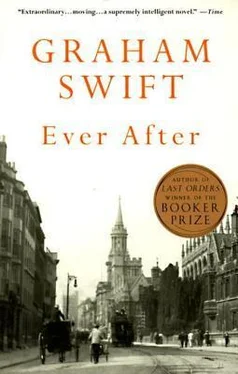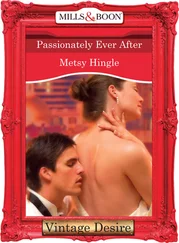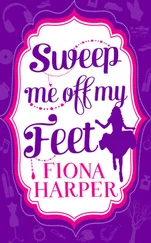I stare hard at Sam, whose face has the dissolved, transparent look that people have when they wish they had the power of disappearance, or when they would be very grateful if, for a few minutes at least, they could be someone other than they are. I suppose, in a different way, this is my look too.
The first thought I register on receiving Sam’s words is a perfectly empirical observation of the state of the world around me. It hasn’t altered. Spring sunshine, with a little flutter of a breeze, caresses the flower beds. A pigeon waddles nonchalantly on the lawn.
The second is the sudden, headlong, insane thought that the blenching, familiar but transmogrified face I see before me is the face — of my father. But this, of course, is impossible; this would be entirely irrational.
So I say, in a voice that surprises me with its rationality, its steadiness, its cool, unpanicking pertinence: “So, if my father wasn’t— Who—?”
“It’s okay. It’s all right. He’s dead. He was dead when Sylvie told him. He was killed in the war. He’s dead.”
I stare at him, not comprehending his propitiating tone. He can’t refuse me more information.
“I think she said he came from Aldermaston. But I guess he was always on the move.… He was an engine-driver, pal. Would you believe it? She had this thing going, back in the Thirties, with an engine-driver. On the main line west.”
The word “innocence” lodges in my mind. A teasing, a fugitive notion, easiest to gauge by its loss. In this metamorphosed condition in which I find myself, in this state of stunned divorce from my former self, it sometimes seems to me that innocence is the very quality of which I have been entirely drained. Self-slaughter, even bungled self-slaughter, is, I believe, a sin. A mortal sin. And yet, as I sit in these paradisiacal surroundings, it seems to me, equally, that innocence is precisely what has been rendered unto me, as if my return to life — if I can call it that — has restored me, but without expunging my memories, to a condition prior to experience.
Innocence. So insidiously close, in sound and sense, to “ignorance.” Not knowing something, we are “innocent of it”—so we say. Yet, from another point of view, only the truth is, truly, innocent. So when Matthew determined to know the truth, was it Matthew who was the foolish innocent, or was it the rest of the world, happy in its worldly credulity? And what of this place right here — this hub, this Mecca of knowledge? Are we innocent other-worldlings, cut off in our cloistered confines from mundane erroneousness, or are we really the arch-villains of the piece? A proper little gang of Fausts? Are we the ones to blame ?
I told myself, of course: it doesn’t matter. What should I do? Nothing. What should I say? Nothing. How am I changed? In no way. The fiction of my life (if that is what it is) may as well serve as the fact. I am my father’s son, meaning my father-whom-I-once-knew-as-my-father’s son, by whose death my life has been so irreversibly moulded. I am who I am. I am Bill Unwin (there, I declare myself!). I am Hamlet the Dane.
Innocence. Innocence.
What I am about to relate occurred only three days after Sam’s annunciatory visit. Yet I don’t think that on that Tuesday morning I was in any particular way altered. Three days had passed, it might be said, since the passing of my innocence. But against this, I maintain, I actually felt more innocent. To discover that for fifty years of your life you have been labouring under a massive misapprehension is a fair enough reminder at least of your capacity for innocence. It puts a sort of childlike hesitancy into your step and a dazed, receptive smile on your face. It makes you feel — as though you have swallowed some initially tranquillizing drug — really quite good .
It was another fine spring day, though there had been rain and, in contrast to the day of Sam’s visit, there was a slight chill in the breeze. That is, I think the chill was in the breeze, not in me. But perhaps what I am struggling to avoid saying is that on that bright May morning, which began with my routinely making my way (always carry on as normal), like a good scholar, from college to library, I felt the first shadowy premonition of what I am now.
For the scholar on foot, the way to the Library (I mean the University Library, not our quaint but incommodious college library) lies along those very paths which Sam and I had trod, on such different business. Over humped bridges, by flowery verges and through budding groves (the veritable groves of academe). There is only one road to cross; then a further, less sylvan path leads to the looming bulk of the Library.
It is hard not to see in this layout an allegorical significance: the Palace — the Citadel — of Knowledge approached through the meads and thickets of Dalliance, along the by-ways of Beguilement. And anyone can be beguiled, even the worthiest pilgrim of Learning. For there, on this spry spring morning, was Potter. Or rather, there was Potter’s easily spotted and meant-to-be-conspicuous car — a red Audi — drawn up at the edge of the road (the Highway of Worldly Traffic) which the good pilgrim must cross. And there, leaning in at the passenger window, was one of the pilgrims. At least she was dressed in the sombre hue of a votary — black skirt, black sweater, black tights, short, pixyish black boots. But such a funereal outfit on a girl of little more than twenty has a way of suggesting not solemnity, not mournfulness at all.
I recognised her as Gabriella, from that evening at Potter’s.
I could see that Potter was leaning across from the driver’s seat and that his hand was extended through the open passenger’s window and was grasping hers. Or rather — which was a crucial difference — he was not grasping her hand, he was grasping her wrist and pulling at it. And it was clear from the tension of her body that, if she was not exactly pulling away, she was resisting his tug. There are only certain limited circumstances in which this sort of contact might occur between a man and a woman (just as there are only certain circumstances in which a woman might stroke, not just touch but quite deliberately, coaxingly stroke, a man’s unsuspecting forearm).
I thought of slinking off — into the Thickets not of Dalliance but of Discretion. But as is often the case when you stumble upon an awkward situation, evasion is more obvious than holding a steady course. I walked on.
Potter saw me first. I’m sure he didn’t wish to see me. I’m sure these were the last circumstances in which he would have wished me to appear on the scene — I admit to savouring my advantage. But then he didn’t know how much I had seen — least of all that I had observed Gabriella in his clutches before, the clutch being then not to the wrist but to the buttock. He let go his grip. She turned: a furl of dark hair; a face, in the gleaming brightness reflected from the wet road, of startled Latin loveliness. A smile — I couldn’t tell exactly — of pleasurable recognition or of flustered gratitude at my timely intervention. She took the opportunity, at any rate, to depart without more ado, moving round to the back of Potter’s car and waiting in the road for a gap in the stream of traffic. I thought: she is going my way, to the Library; I should continue in that direction too. Then Potter, still leaning across towards the passenger window, exclaimed, “Ah, Bill — just the man,” as if he had been expecting me all along. Then he added, opening the passenger door, “Get in.”
“I’m going to the Library,” I said. My eyes may have flickered for a moment to where Gabriella was still standing, waiting for the chance to cross.
Читать дальше












